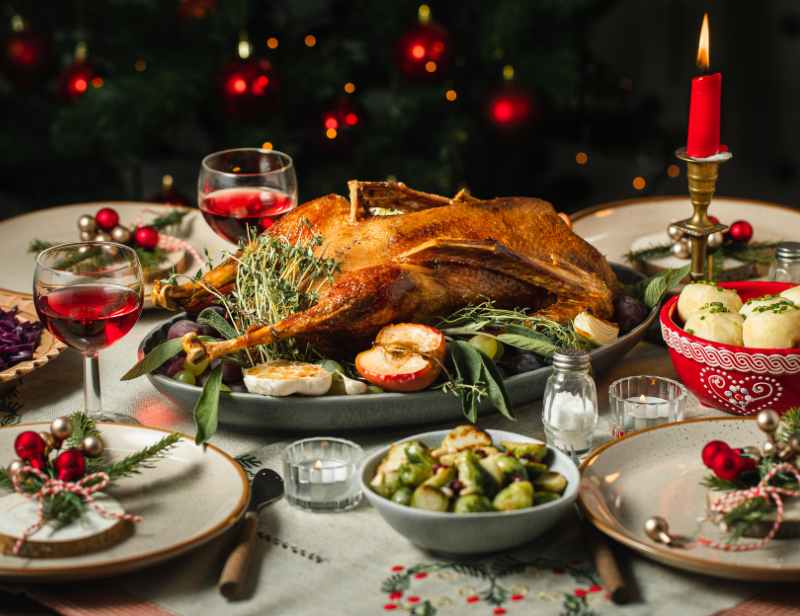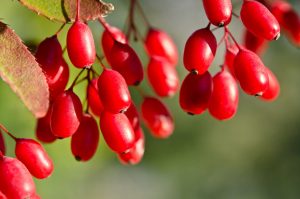A traditional Christmas dinner isn’t just a festive indulgence; it’s a meal brimming with nutrients that can support women’s health, particularly during perimenopause.
A traditional Christmas dinner isn’t just a festive indulgence; it’s a meal brimming with nutrients that can support women’s health, particularly during perimenopause.
As hormone levels fluctuate, prioritising foods that help balance hormones, reduce inflammation, and support overall wellbeing is essential.
Let’s explore the top 10 nutritional benefits of a classic Christmas dinner, focusing on how it can benefit women in this transitional stage of life.
1. Turkey: A Protein for Hormonal Balance
Turkey is the star of the show at most Christmas dinners and offers more than just a delicious flavour.
– Health Benefits: Protein is crucial for maintaining muscle mass, which can decline during perimenopause. Turkey’s high tryptophan content also supports serotonin production, promoting mood stability.
– Key Nutrients: B vitamins (B6 and niacin) help regulate energy levels and hormone production, while selenium supports thyroid function, which often requires extra attention during perimenopause.
2. Roast Potatoes: Energy and Potassium Boost
Crispy roast potatoes are a staple of the traditional Christmas dinner.
– Health Benefits:Potassium in potatoes helps reduce bloating and supports adrenal health, which is critical during hormonal shifts. The slow-releasing carbs provide steady energy, helping to combat fatigue.
– Key Nutrients:Rich in potassium and vitamin C, which aids collagen production, supporting skin health that can change during perimenopause.
3. Brussel Sprouts: Hormone Detoxifiers
These festive greens are a nutritional powerhouse, especially for hormone health.
– Health Benefits: Contain compounds like indole-3-carbinol that support oestrogen metabolism, helping the body process excess hormones. High fibre content aids digestion and promotes gut health, crucial for hormone regulation.
– Key Nutrients: Vitamin K supports bone health, while vitamin C boosts immunity and skin elasticity.
4. Carrots: Supporting Hormonal Skin Health
Bright and sweet, carrots are a wonderful addition to any festive plate.
– Health Benefits: Beta-carotene (converted into vitamin A) is essential for maintaining healthy skin, which can become drier during perimenopause. It also supports vision and immune health.
– Key Nutrients: Beta-carotene, vitamin C, and potassium.
5. Cranberry Sauce: A Urinary Tract Ally
This tangy condiment offers more than just a pop of colour.
– Health Benefits: Cranberries are known for supporting urinary tract health, which can become more prone to issues during perimenopause. They also contain antioxidants that reduce inflammation.
– Key Nutrients: Vitamin C and manganese, which supports healthy bones and metabolism.
6. Stuffing: A Fibre and Herb Boost
When made with whole grains and fresh herbs, stuffing becomes a hormone-friendly addition.
– Health Benefits: Fibre from whole grains supports gut health, which is vital for detoxifying excess oestrogen. Herbs like sage and thyme contain phytoestrogens, plant-based compounds that mimic oestrogen to help balance levels naturally.
– Key Nutrients: B vitamins and iron, essential for energy and reducing the risk of anaemia, which can be more common during perimenopause.
7. Parsnips: The Sweet Root for Adrenal Support
Roasted parsnips add a subtle sweetness to your meal and deliver key nutrients for hormone health.
– Health Benefits: Their natural sweetness supports steady blood sugar levels, reducing stress on the adrenal glands. Fibre content aids in stabilising insulin, a hormone that plays a key role in overall hormonal balance.
– Key Nutrients: Folate for cell health, vitamin C for immune support, and potassium for fluid balance.
8. Gravy: Trace Minerals for Hormonal Health
Homemade gravy made with meat drippings adds both flavour and nutrition.
-Health Benefits: Provides zinc and iron, which are essential for energy and immune health, particularly when hormones are in flux.
– Key Nutrients: Zinc supports hormone production, while iron combats fatigue, a common symptom during perimenopause.
9. Christmas Pudding: A Sweet Treat with Benefits
Packed with dried fruits and nuts, Christmas pudding offers a surprising range of nutrients.
– Health Benefits: Nuts like almonds and walnuts provide magnesium, which helps reduce stress and supports sleep, while dried fruits offer natural energy and fibre for gut health.
– Key Nutrients: Iron, magnesium, and potassium. The phytoestrogens in nuts may help balance hormone levels.
10. Red Wine (Optional): A Heart-Healthy Sip
A glass of red wine with Christmas dinner can have its benefits when enjoyed in moderation.
– Health Benefits: Red wine contains resveratrol, a compound linked to improved heart health and reduced inflammation, which are critical during perimenopause.
– Key Nutrients:mPolyphenols that support vascular health and small amounts of potassium and iron.
Tips for a Perimenopause-Friendly Christmas Dinner
– Opt for Healthy Fats: Use olive oil or avocado oil for roasting to support heart and brain health.
– Boost Veggie Portions: Fill at least half your plate with vegetables to increase fibre and antioxidants.
– Limit Sugar: Choose fresh cranberry sauce and light puddings to keep blood sugar steady.
Conclusion
A traditional Christmas dinner can be both a festive indulgence and a nutritional boon, particularly for women navigating perimenopause. By focusing on balanced portions, hormone-supportive ingredients, and mindful preparation, you can enjoy a meal that nourishes both body and soul.









